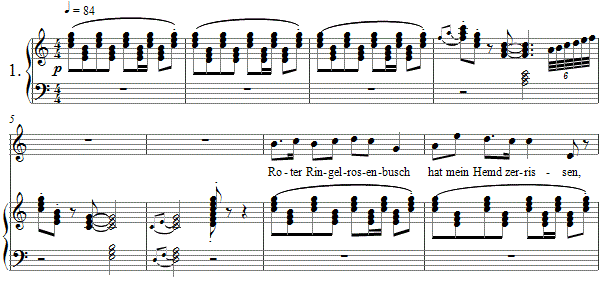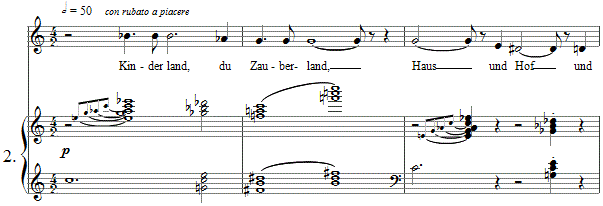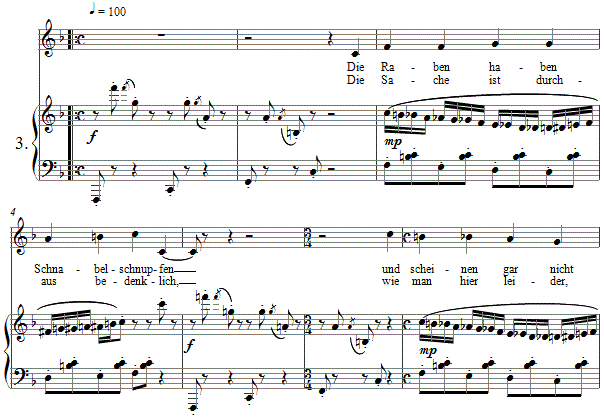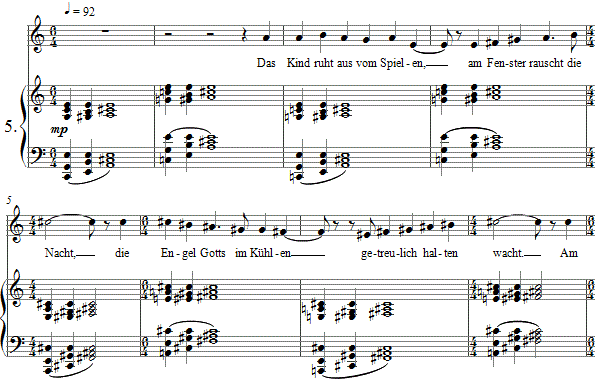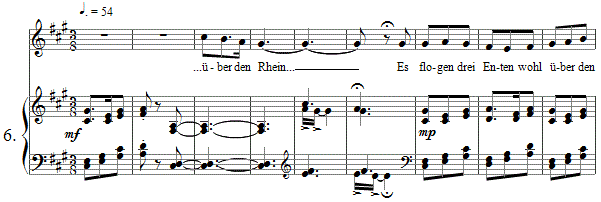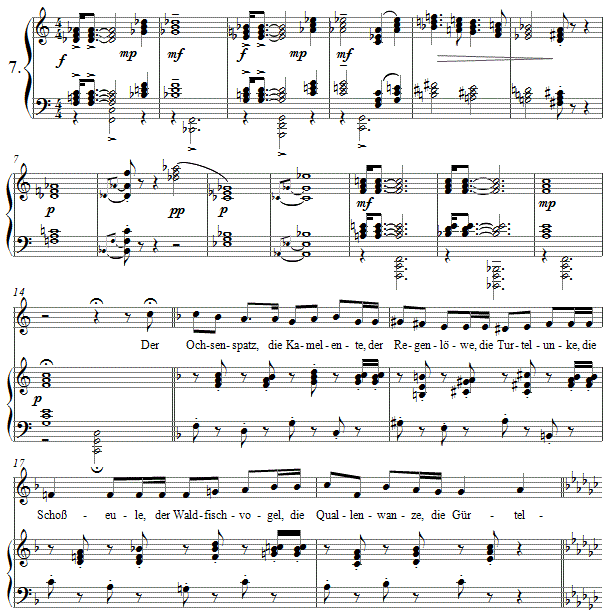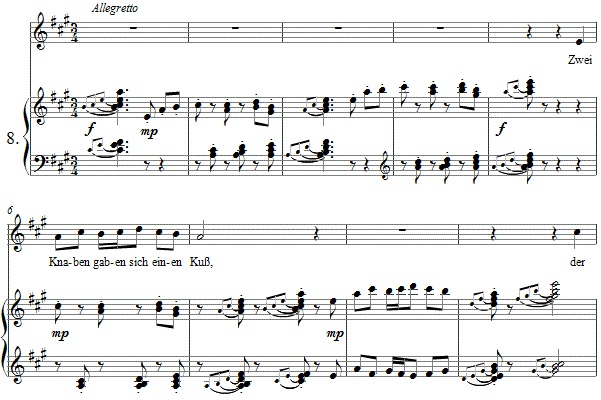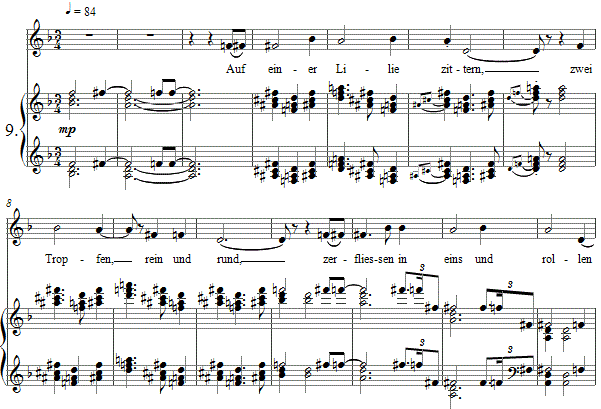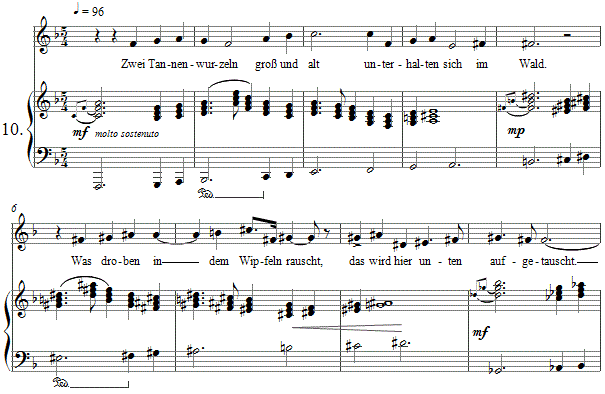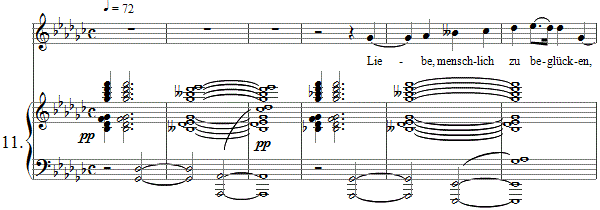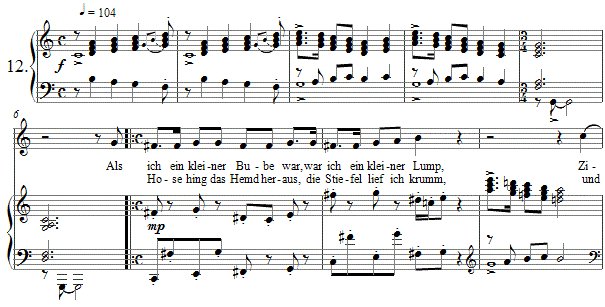Music and Texts of GARY BACHLUND
Vocal Music | Piano | Organ | Chamber Music | Orchestral | Articles and Commentary | Poems and Stories | Miscellany | FAQs
Zwölf Kinder-lieder für Erwachsene - (2011)
Bernstein, Liliencron, Kyber, Eichendorff, Morgenstern, Hebbel, Goethe, Busch and anonymous texts
for medium voice and piano
i. Rosenringel - Elsa Bernstein (1866-1949)
Roter Ringelrosenbusch hat mein Hemd zerrissen,
weißes Schnabelgänslein hat mich in's Bein gebissen.
Der Busch darf nicht mehr Rosen tragen,
weißes Gänslein werd'ich schlagen,
roter Ringelrosenbusch, Husch, husch!
ii. Kinderland, du Zauberland - Detlev von Liliencron (1844-1909)
Kinderland, du Zauberland,
Haus und Hof und Hecken.
Hinter blauer erwand
spielt die Welt Verstecken.
iii. Rabenschabelschnupfen - Manfred Kyber (1880-1933)
Die Raben haben Schnabelschnupfen
Und scheinen gar nicht wohl zu sein.
In Tücher mit und ohne Tupfen
Verpacken sie sich sorgsam ein.
Die Sache ist durchaus bedenklich,
Wie man hier leider, leider sieht.
Und auch die Kinder scheinen kränklich
Und von erkältetem Gemüt.
Oh, schont euch, hütet euch zu hupfen
Und bleibt im Neste weich gewiegt,
Dass ihr zum Rabenschnabelschnupfen
Nicht auch das Krallenrheuma kriegt!
iv. Ball der Tiere - Anonym
Mir dünkt, wir geben einen Ball!
Sprach Frau Nachtigall.
So?
Sprach der Floh.
Was werden wir essen?
Sprachen die Wespen.
Nudeln!
Sprachen die Pudeln.
Was werden wir trinken?
Sprachen die Finken.
Bier!
Sprach der Stier.
Nein, nein!
Sprach das Schwein.
Wo werden wir tanzen?
Sprachen die Wanzen.
Im Haus!
Sprach die Maus.
v. Gottes Segen - Joseph von Eichendorff (1788-1857)
Das Kind ruht aus vom Spielen,
Am Fenster rauscht die Nacht,
Die Engel Gotts im Kühlen
Getreulich halten Wacht.
Am Bettlein still sie stehen,
Der Morgen graut noch kaum.
Sie küssen's, eh sie gehen,
Das Kindlein lacht im Traum.
vi. Es flogen drei Enten... - Anonym
Es flogen drei Enten wohl über den Rhein
Mit ihren drei goldenen Schnäbelein.
Die erste hieß Frau Mäs,
Die andere Frau Päs,
Dir dritte Frau Tricktracktrilli .
Hm, hm, sprach Frau Mäs zur Frau Päs,
Was hat die Frau Tricktracktrilliäs
Für ein dickes Gesäß!
vii. Neue Bildungen - Christian Morgenstern (1871-1914)
Der Ochsenspatz
die Kamelente
der Regenlöwe
die Turtelunke
die Schoßeule
der Walfischvogel
die Quallenwanze
der Gürtelstier
der Pfauenochs
der Werfuchs
die Tagtigall
der Sägeschwan
der Süßwassermops
der Weinpinscher
das Sturmspiel
der Eulenwurm
der Giraffenigel
das Rhinozepony
die Gänseschmalzblume
der Menschenbrotbaum.
viii. Zwei Knaben - Anonym
Zwei Knaben gaben sich einen Kuß,
der eine, der hieß Julius,
der andere hieß Gretchen,
ich glaub', das war ein Mädchen.
ix. Ich und Du - Friedrich Hebbel (1813-1863)
Auf einer Lilie zittern
Zwei Tropfen, rein und rund,
Zerfließen in eins und rollen
Hinab in des Kelches Grund.
x. Die zwei Wurzeln - Christian Morgenstern (1871-1914)
Zwei Tannenwurzeln groß und alt
unterhalten sich im Wald.
Was droben in den Wipfeln rauscht,
das wird hier unten ausgetauscht.
Ein altes Eichhorn sitzt dabei
und strickt wohl Strümpfe die zwei.
Die eine sagt: knig. Die andre sagt: knag.
Das ist genug für einen Tag.
xi. Liebe - Johann Wolfgang Goethe (1749-1832)
Liebe, menschlich zu beglücken,
Nähert sie ein edles Zwei,
Doch zu göttlichem Entzücken
Bildet sie ein köstlich Drei.
xii. Als ich ein kleiner Bube war - Wilhelm Busch (1832-1908)
Als ich ein kleiner Bube war,
War ich ein kleiner Lump;
Zigarren raucht' ich heimlich schon,
Trank auch schon Bier auf Pump.
Zur Hose hing das Hemd heraus,
Die Stiefel lief ich krumm,
Und statt zur Schule hinzugeh'n,
Strich ich im Wald herum.
Wie hab' ich's doch seit jener Zeit
So herrlich weit gebracht! -
Die Zeit hat aus dem kleinen Lump
'n großen Lump gemacht.[ 16 pages, circa 13' 20" ]
This collection of songs was the excuse to play with delightful shorter texts by a range of poets, including the well-known Anonymous. The rhymed paraphrases are sometimes very different from the originals for the sake of the humor in English, as best it came to me with a glass of port beside.

Twelve Children's Songs for Grown-ups
Copyright © 2011 Gary Bachlund All international rights reserved.
i. Rose RingletsElsa Bernstein (1866-1949) , under the pseudonym Ernst Rosmer, from Königskinder
Red rosebush ringlets have torn my shirt,
The white gosling has pecked me on my shin.
That bush no longer bears roses for my hurt,
And that white goose? I'll kill it with a grin.
Red rosebush's ringlets, shoo, shoo!
A children's style sing-song setting for this rather happily vicious little text.
ii. Childhood, you're a magic land
Detlev von Liliencron (1844-1909)
Childhood, you're a magic land,
Of house and yard and hedge rows.
Behind the forest's blue walls' stand
The world's hide-and-seek goes.
A polytonal palette draws away from the common world into colors unexpected.
iii. Ravens' Beaks' SnifflesManfred Kyber (1880-1933)
Little ravens have caught colds in their beaks,
And they don't know what to do.
Handkerchiefs with and without spots
Carefully wrap them against the flu.
One watches with regret-filled regretting,
As it's all such a disturbing view;
The wee ones seem very sickly
When they're exposed to such a flu.
Listen here, take care just the same;
Stay in the comfort of a nest,
That your ravens' beaks' sniffles
Don't become worse for not being suppressed!
A simple melody accompanied by a long sagging arch of chromaticism, which ends with a written sneeze.
iv. The Animals' Ball
Anonymous
"We'll give a ball, I think,"
Said a nightingale with a wink.
"Really?"
Sang the song of the flea.
"What's on the menu?"
Wasps asked of the venue.
"Noodles!"
Yelped caboodles of poodles.
"What about booze?"
The finches sought news.
"Beer!"
Bawled a bull in the rear.
"Oh no! Not to swig,"
Prattled a pig.
"Can we cut a rug?"
Asked a dancing bug.
"At my house!"
Shouted a mouse.
A patter song.
v. God's Blessing
Joseph von Eichendorff (1788-1857)
From a day of play, a child rests;
At the window night rushes past.
God's angels stand their watch
Through the darkness cool and vast.
At the bedside they silently stay
Till the dawn with sunlight streams.
Their angels' kiss is simple bliss,
As the child smiles in its dreams.
A chant-like set of rising and falling lines with easily shifting harmonies beneath.
vi. Three Ducks Flew...
Anonymous
Three ducks flew over the Rhine,
How their three golden beaks did shine!
The first was a Missus Rather Fat,
The second a Missus Double That,
The third, Miss Tick-Tock-Doofus-Duck.
Ha! said Rather Fat to Double That,
Miss Tick-Tock-Doofus-Duck
Has a butt so fat, I'm thunderstruck!
A folk song-like setting, as if accompanied by harp.
vii. Neue Bildungen
Christian Morgenstern (1871-1914)
The ox-sparrow, (a rather huge Bull-finch)
the camel-duck, (in its feathered oasis bed)
the rain-lion, (roars with moistening thunder)
the turtle-toad, (has a carcase of fire red)
the lap-owl, (must sit to query, "who?")
the whale-bird, (beware when overhead)
the jellyfish-bug, (not welcome in a jam)
the belt-bull, (horned buckles to dread)
the pheasant-ox, (with a pluming idiot's tail)
the were-fox, (wolfs down a quadruped)
the day-ingale, (sings of the morning star)
the saw-swan, (snores at the river bed)
the fresh-water-pug, (not a salty dog)
the wine-pinscher, (a Sober-man's not bred)
the storm-game, (lightning strikes out again)
the owl-worm, (over "who" we might tread)
the giraffe-hedgehog, (a long-necked stick in the mud)
the rhinocer-pony, (horning in a rancher's shed)
the goose-fat-flower, (strange at any hour)
the human-bread-tree (makes a poet well fed)
New pictures for a dunderhead!
Strange polytonal gestures introduce a patter song, which then becomes mixed up as to which key is being sung, with the odd polytonal images imposing themselves as the setting continues, ending in a tonality distant from which it began without rhyme or reason, with the title of the song as the last lyric. The paraphrase above extends Morgenstern's silly images into larger but still silly imagery. The last phrase of the accompaniment sings out the opening phrase of the hymn, "Wie schön leuchtet der Morgenstern," of Philipp Nicolai from 1597.
viii. Two Chaps
Anonymous
Two chaps managed a kiss,
The one, whose name was Julius,
The other's name was Gretchen,
And I gather, she was rather fetchin'.
The score is marked "Er war bei Gretchen ganz allein..." to reference Beethoven's delightful little opus 128, Der Kuß. A tiny musical snippet reminds of this as well.
ix. I and You
Friedrich Hebbel (1813-1863)
On a lily pad did there gleam
Two droplets, pure and round.
They were wed, and in a dream
Dropped into the chaliced ground.
A gentle and lyric setting sings the tale of love told in metaphor, as major and minor wed.
x. The Two Tree Roots
Christian Morgenstern (1871-1914)
Two evergreen roots, great and old,
Held forth awhile in the wooded wold.
That which in the tree tops sighed
Would be known, the gnarled roots implied.
An old unicorn was sitting near
Knitting socks for them, from what I hear.
Said one: Quite right. The other: Yes, quite.
That's enough of that, day or night.
The four-measure ground repeats as it is forced through varying tonal regions, a melodic recitation over its unfolding.
xi. Lover
Johann Wolfgang Goethe (1749-1832)
Love, to the delight of all man,
By loving brings to two,
And through God's goodly plan,
Creates a third; that's you.
A simple hymn over broad four-note chord successions.
xii. When I was a little lad
Wilhelm Busch (1832-1908)
When I was just a little lad,
I was quite the scoundrel too.
I'd sneak cigars when home alone
And sneak golden beery brew.
My shirt tails trailed to my socks,
My boots led me astray,
And underway to classes
I wandered into the woods to play.
What have I done with the days now past
And brought so many things? --
Time's passing has made the little brat
Into the grown-up scoundrel that this song sings!
A lightly bawdy song of brittle, music-hall accompaniment and one correct wrong note.
The song collection is available as a free PDF download, though any major commercial performance or recording of the work is prohibited without prior arrangement with the composer. Click on the graphic below for this piano-vocal score.
Zwölf Kinder-lieder für Erwachsene

